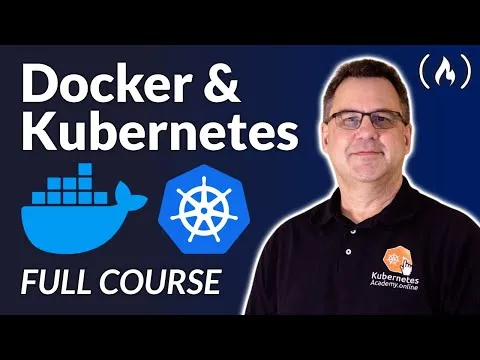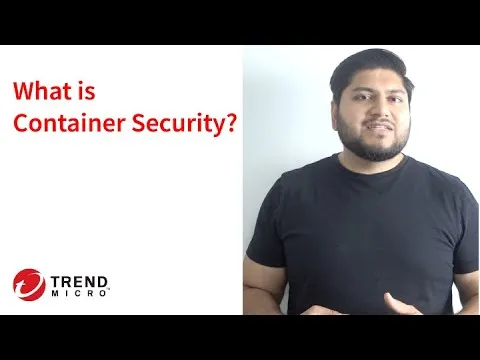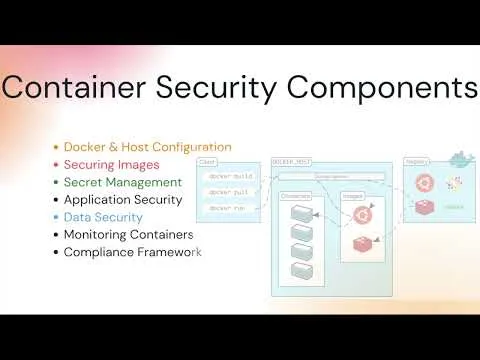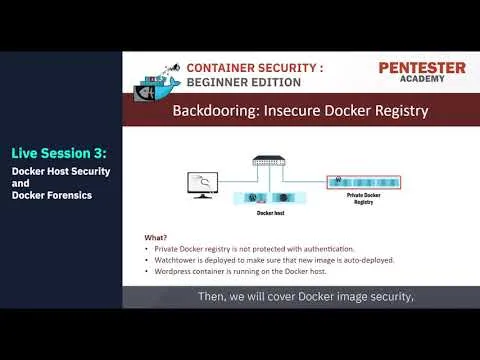
Docker Containers and Kubernetes Fundamentals : Full Hands-On Course 
Learn the fundamentals of Docker Containers and Kubernetes in this comprehensive hands-on course. Discover how to containerize applications using the Docker CLI and Visual Studio Code, and push and pull container images on Docker Hub. Dive into Kubernetes architecture and learn how to run, debug, and troubleshoot applications and services using the Kubernetes CLI and Visual Studio Code. Explore pods and different workloads available. Taught by Guy Barrette, a certified expert in Kubernetes, Terraform, Azure, AWS, and GCP, this course is perfect for beginners. Don't miss out on this opportunity to enhance your skills in containerization and orchestration. ▼
ADVERTISEMENT
Course Feature
![]() Cost:
Cost:
Free
![]() Provider:
Provider:
Youtube
![]() Certificate:
Certificate:
No Information
![]() Language:
Language:
English
![]() Start Date:
Start Date:
2022-10-12 00:00:00
Course Overview
❗The content presented here is sourced directly from Youtube platform. For comprehensive course details, including enrollment information, simply click on the 'Go to class' link on our website.
Updated in [September 26th, 2023]
We considered the value of this course from many aspects, and finally summarized it for you from two aspects: skills and knowledge, and the people who benefit from it:
(Please note that our content is optimized through artificial intelligence tools and carefully reviewed by our editorial staff.)
What skills and knowledge will you acquire during this course?During this course, the learner will acquire the following skills and knowledge:
- Understanding of microservices concepts, including their advantages, drawbacks, and anti-patterns.
- Knowledge of cloud-native concepts and the Cloud Native Foundation.
- Familiarity with container concepts and the Docker platform.
- Ability to containerize applications using the Docker CLI and Visual Studio Code.
- Understanding of Docker volumes and how to use them to persist data.
- Knowledge of Docker Compose and its YAML file structure.
- Ability to use Docker Compose to create and manage multi-container applications.
- Familiarity with container registries and how to push and pull container images from Docker Hub.
- Understanding of Kubernetes architecture and its components.
- Ability to run Kubernetes locally and use the Kubernetes CLI and Visual Studio Code to manage applications and services.
- Knowledge of namespaces and how to use them to organize and isolate resources.
- Understanding of nodes in Kubernetes, including master and worker nodes.
- Familiarity with pods and their lifecycle, including the use of init containers.
- Ability to use selectors to filter and select resources in Kubernetes.
- Knowledge of multi-container pods and common patterns for running multiple containers in a pod.
- Understanding of different Kubernetes workloads, including ReplicaSet, Deployment, DaemonSet, StatefulSet, Job, and CronJob.
- Ability to perform rolling updates and blue-green deployments in Kubernetes.
- Familiarity with services in Kubernetes and their different types, including ClusterIP, NodePort, and LoadBalancer.
- Understanding of storage and persistence concepts in Kubernetes.
- Knowledge of application settings and how to manage them in Kubernetes.
Who will benefit from this course?
This course on Docker Containers and Kubernetes Fundamentals will benefit individuals and professionals in the following areas:
1. Software Developers: Developers who want to learn how to containerize their applications using Docker and deploy them using Kubernetes will find this course extremely valuable. They will learn how to use the Docker CLI and Visual Studio Code to containerize their applications and push/pull container images on Docker Hub. They will also learn about Kubernetes architecture, how to run it locally, and use the Kubernetes CLI and Visual Studio Code to deploy and manage their applications.
2. DevOps Engineers: DevOps engineers responsible for managing the deployment and scaling of applications will benefit from this course. They will learn how to use Docker Compose to create multi-container applications and manage them as a single unit. They will also learn about Kubernetes concepts like pods, workloads, and services, which are essential for managing containerized applications in a production environment.
3. System Administrators: System administrators who are responsible for managing infrastructure and deploying applications will find this course helpful. They will learn how to set up and configure Docker and Kubernetes on their local machines, as well as how to use the Kubernetes CLI to manage and troubleshoot applications and services.
4. IT Professionals: IT professionals who want to enhance their knowledge and skills in containerization and orchestration technologies like Docker and Kubernetes will benefit from this course. They will gain a solid understanding of container concepts, Docker, and Kubernetes architecture, and how to use these technologies to deploy and manage applications.
5. Cloud Architects: Cloud architects who design and implement cloud-native applications will find this course valuable. They will learn about cloud-native concepts and hands-on exercises to understand how to build and deploy cloud-native applications using Docker and Kubernetes.
Course Provider

Provider Youtube's Stats at AZClass
Discussion and Reviews
0.0 (Based on 0 reviews)
Explore Similar Online Courses

Too Much Tape?! Lash Extension Taping Details & Why I Think This Works Best for Me #yegilashtips

How I Learnt Urdu Script in 1 Month (And How You Can Too!)

Python for Informatics: Exploring Information

Social Network Analysis

Introduction to Systematic Review and Meta-Analysis

The Analytics Edge

DCO042 - Python For Informatics

Causal Diagrams: Draw Your Assumptions Before Your Conclusions

Whole genome sequencing of bacterial genomes - tools and applications

What is container security?

Top 10 Docker Container Security Best Practices with Tutorial


Start your review of Docker Containers and Kubernetes Fundamentals : Full Hands-On Course